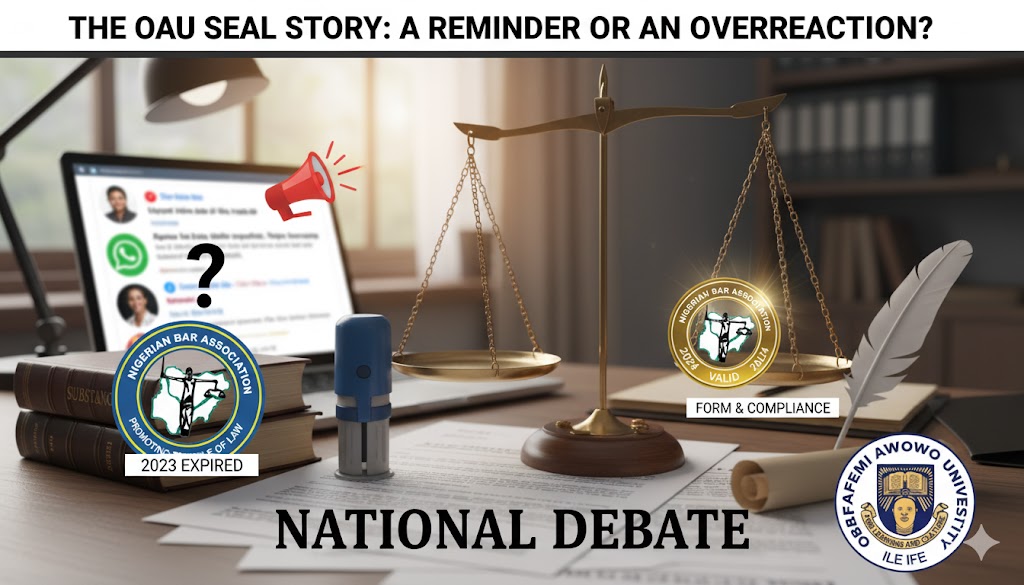This week, the legal space was thrown into an interesting debate after a precautionary notice from the Obafemi Awolowo University (OAU) went public. The notice warned lawyers handling the university’s legal matters to avoid using expired NBA seals. It looked like a normal compliance reminder, but it quickly became the centre of a national conversation.
In the memo, OAU management stressed that all legal documents related to the university must carry valid NBA seals. To some people, it was just due diligence. To others, it felt like an unnecessary drama. Within hours, lawyers and law students across X and WhatsApp groups began sharing opinions, analysing what it really meant.
What Sparked the Debate
At the heart of it all is a simple but controversial question: does an expired NBA seal affect the validity of a legal document?
The NBA seal is what confirms a lawyer’s right to practice in a particular year. It is issued after a lawyer pays the annual practicing fee. By design, a seal from 2023 shows that the lawyer was in good standing for that year. Once the new legal year starts, using that old seal could mean the lawyer hasn’t renewed their membership.
But does that make any document they sign invalid? Opinions differ. Some lawyers argue that an expired seal does not affect the substance of a legal document. They say it’s more of a disciplinary issue, not a technical ground to invalidate a process. Others believe that since the seal represents proof of active status, using an expired one can raise serious ethical questions.
One Lagos-based lawyer put it this way: “It may not nullify the document, but it weakens its credibility. If you’re not in good standing with the Bar, you shouldn’t be signing legal processes.”
OAU’s Side of the Story
The university’s legal unit later clarified that the notice was only a precautionary measure. According to reports, it was never meant to accuse anyone or create controversy. Instead, the team said it was just ensuring that all documents leaving OAU meet ethical and professional standards.
An insider noted, “We only wanted to remind our legal officers and external counsel to stay compliant. It’s about setting an example.”
Still, the clarification did not stop the debate. Many lawyers felt the notice could have been handled quietly within the legal department instead of circulating widely. Some saw it as a sign of internal misunderstanding, while others felt it was simply the university taking compliance seriously.
Public Reactions
Reactions were divided. Some praised OAU for emphasizing professional ethics. “The seal is proof that you are licensed to act. It’s only right that an institution like OAU insists on valid seals,” one X user commented.
Others disagreed, saying it was unnecessary and could have been addressed internally. A user wrote, “This should have been an internal reminder, not a public statement. It makes the institution look disorganized.”
The memo also gave rise to a wave of humour online, as many joked that “expired seals now trend more than constitutional amendments.”
Beyond OAU: The Bigger Picture
This incident goes beyond one university. It raises a broader issue about compliance culture in Nigeria’s legal community. Many lawyers agree that procedural discipline is important, but they also point out that administrative delays and technicalities sometimes make things messy.
For example, a lawyer may have paid for a new seal but hasn’t received it yet. If they sign a document within that period, is it considered “expired”? These are the small grey areas that make the issue less straightforward than it seems.
As one senior advocate explained, “The seal is a symbol of discipline, but we must be careful not to elevate form over substance. What matters most is whether the lawyer is actually qualified and in good standing.”
A Teachable Moment
For young lawyers and students, the OAU story is a lesson in detail and perception. In law, even small compliance issues can spark bigger debates. It also reminds institutions to manage internal communications more carefully, because once a memo gets out, the internet takes over the narrative.
What started as an internal precaution has now become a talking point about legal ethics, professionalism, and public perception. It shows that in the legal space, procedure and image go hand in hand.
At the end of the day, this isn’t really about expired seals. It’s about how the legal community sees responsibility, image, and compliance. The OAU memo might have been routine, but it ended up sparking a needed conversation about how much attention lawyers and institutions should pay to professional standards.
Maybe it wasn’t an overreaction after all. Maybe it was a reminder that in law, even the smallest details can make the loudest headlines.



